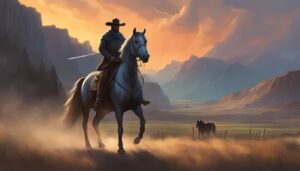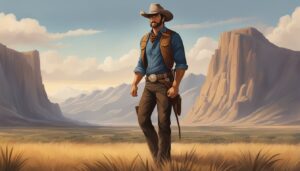Western legends have captivated audiences for generations, with modern interpretations like Yellowstone’s John Dutton and classic icons like Wyatt Earp from Tombstone vying for the title of most impressive hero. Both characters embody the rugged individualism and frontier justice associated with the American West, albeit in different eras.
John Dutton, portrayed by Kevin Costner in the hit series Yellowstone, is a contemporary rancher fighting to preserve his family’s legacy in Montana. His character blends traditional Western values with modern complexities, facing challenges from land developers, politicians, and rival ranchers. Dutton’s impressive qualities lie in his unwavering determination to protect his land and family, often employing morally ambiguous methods that blur the line between hero and antihero.
Wyatt Earp, immortalized in the 1993 film Tombstone, represents the quintessential Old West lawman. Known for his involvement in the infamous Gunfight at the O.K. Corral, Earp’s legend has grown over time. The film portrays him as a skilled gunfighter and strategist, dedicated to bringing order to the lawless frontier. His impressive attributes include his loyalty to family and friends, his courage in the face of danger, and his commitment to justice, even when it meant taking the law into his own hands.
Historical Context and Popularity

The Western genre has captivated audiences for generations, with legendary figures and modern interpretations shaping its evolution. Both Wyatt Earp and John Dutton represent pivotal characters that reflect their respective eras in Western storytelling.
The Allure of the Western Genre
Westerns have long held a special place in American culture. The genre romanticizes the rugged individualism and frontier spirit of the American West. It often portrays moral dilemmas, justice, and the clash between civilization and wilderness.
Iconic figures like Wyatt Earp became synonymous with the Old West. Their stories of lawmen taming wild towns captured the public’s imagination.
In recent years, the Western has seen a resurgence. New interpretations blend traditional elements with contemporary themes, attracting modern audiences.
Cultural Impact of ‘Tombstone’
‘Tombstone’ (1993) revitalized interest in Wyatt Earp and the Western genre. The film’s portrayal of Earp as a complex hero resonated with viewers.
It achieved cult status, inspiring debates about Earp’s legacy. The movie’s quotable dialogue and stylized gunfights became pop culture touchstones.
‘Tombstone’ performed well at the box office, earning $56.5 million domestically. Its enduring popularity has led to frequent television reruns and home video sales.
Influence of ‘Yellowstone’ on Modern Television
‘Yellowstone’ has redefined the Western for the 21st century. The show blends traditional Western elements with contemporary issues like land rights and political intrigue.
Kevin Costner’s John Dutton embodies a modern Western patriarch. His character grapples with preserving a way of life in a changing world.
The series has sparked a new wave of Western-themed television. Its success has led to spin-offs and inspired other networks to develop similar shows.
‘Yellowstone’ consistently ranks as one of cable TV’s highest-rated dramas. It has introduced the Western genre to a new generation of viewers.
Character Analysis

John Dutton and Wyatt Earp stand as iconic figures in the Western genre, each embodying distinct qualities of leadership, morality, and frontier justice. Their characters offer a fascinating study in contrasts between modern and historical interpretations of the Western hero archetype.
John Dutton: The Modern Western Hero
John Dutton, portrayed by Kevin Costner in Yellowstone, represents a complex, contemporary take on the Western hero. As the patriarch of the Dutton family, he fiercely protects his vast Montana ranch through a combination of political maneuvering and ruthless tactics.
Dutton’s moral ambiguity sets him apart from traditional Western protagonists. He often operates in shades of gray, willing to bend or break laws to preserve his family’s legacy. This complexity adds depth to his character, making him both sympathetic and controversial.
His leadership style blends old-world values with modern pragmatism. Dutton’s unwavering commitment to his land and family echoes traditional Western themes, while his savvy business acumen reflects the challenges of the 21st century ranching industry.
Wyatt Earp: The Legendary Lawman
Wyatt Earp, immortalized in numerous Western films including Tombstone, embodies the classic frontier lawman. His reputation as a skilled gunfighter and peacekeeper in the Wild West has cemented his place in American folklore.
Earp’s character is often portrayed as a steadfast upholder of justice, driven by a strong moral code. His legendary involvement in the Gunfight at the O.K. Corral, alongside his brothers and Doc Holliday, exemplifies his commitment to law and order in a chaotic frontier environment.
Unlike John Dutton, Earp’s character typically aligns more closely with traditional heroic archetypes. He is usually depicted as operating within the bounds of the law, even when faced with dangerous outlaws and corrupt officials.
Earp’s leadership is characterized by his ability to rally allies and maintain order in lawless territories. His legacy as a fearless lawman continues to influence portrayals of Western heroes in modern media.
Portrayal in Media

Hollywood has brought the legends of Wyatt Earp and John Dutton to life through powerful performances and memorable casting choices. These portrayals have shaped public perception of Western heroes and captivated audiences.
‘Tombstone’ Casting and Performances
Kurt Russell stepped into the boots of Wyatt Earp in the 1993 film ‘Tombstone’. His portrayal captured Earp’s determination and grit. Val Kilmer stole scenes as the charismatic Doc Holliday, delivering quotable lines with flair.
Sam Elliott and Bill Paxton rounded out the Earp brothers, adding depth to the family dynamic. Powers Boothe brought menace to his role as Curly Bill Brocius, while Michael Biehn’s Johnny Ringo provided a cunning adversary.
Kevin Jarre’s script and George P. Cosmatos’s direction allowed the ensemble cast to shine. The film’s depiction of the conflict with the Cochise County Cowboys, led by Ike Clanton, became an instant classic in the Western genre.
Creation of ‘Yellowstone’: Casting and Narrative
Kevin Costner’s portrayal of John Dutton anchors the modern Western drama ‘Yellowstone’. His performance blends traditional cowboy values with contemporary challenges, creating a complex patriarch.
The show’s creators crafted a narrative that explores family loyalty, land preservation, and moral ambiguity. This approach resonated with audiences, turning ‘Yellowstone’ into a cultural phenomenon.
Supporting cast members bring depth to the Dutton family saga. Their performances highlight the struggles of maintaining a ranching legacy in the 21st century.
‘Yellowstone’ has redefined the Western genre for television, inspiring merchandise and boosting tourism to Montana. The show’s success demonstrates the enduring appeal of Western storytelling when combined with modern themes and production values.
Iconic Showdown: The Gunfight at the O.K. Corral
The Gunfight at the O.K. Corral stands as a defining moment in Wild West history. This brief but intense shootout in Tombstone, Arizona has captured the public imagination for generations.
Historical Authenticity and Hollywood Dramatization
The real gunfight lasted less than a minute on October 26, 1881. It pitted lawmen Wyatt Earp, his brothers Virgil and Morgan, and Doc Holliday against a group of outlaws known as the Cowboys.
The conflict arose from complex personal and political rivalries in Tombstone. While often portrayed as a classic Western showdown, the reality was far messier.
Hollywood has frequently dramatized this event, shaping public perception of the Old West. Films like “Gunfight at the O.K. Corral” (1957) and “Tombstone” (1993) have cemented its legendary status.
These portrayals often emphasize heroism and adventure, glossing over the brutal nature of frontier violence.
On-Screen Representation of the Earp Vendetta Ride
The aftermath of the O.K. Corral shootout, known as the Earp Vendetta Ride, has also been depicted on screen. This period saw Wyatt Earp and his allies pursuing those they held responsible for attacks on the Earp family.
Films often portray this as a righteous quest for justice. In reality, it was a complex series of violent encounters that blurred the lines between law and vengeance.
Actor Michael Madsen notably portrayed Wyatt Earp in a TV film about this period. His portrayal emphasized Earp’s determination and ruthlessness during the vendetta ride.
These depictions continue to shape the legend of Wyatt Earp, transforming him from a frontier lawman into an iconic Western hero.
Legacy and Influence

John Dutton and Wyatt Earp have left indelible marks on Western mythology, shaping portrayals of frontier justice and rugged individualism. Their influence extends beyond the screen, permeating popular culture and historical narratives.
Influence on Later Western Films
Wyatt Earp’s legend inspired numerous films, including “Tombstone” and the eponymous “Wyatt Earp” starring Kevin Costner. These movies cemented Earp’s status as an archetypal lawman. The 1993 film “Tombstone” particularly influenced later Westerns with its gritty realism and memorable portrayal of Doc Holliday.
John Dutton’s character in “Yellowstone” draws from this cinematic lineage. The show’s success has revitalized interest in modern Westerns, sparking a new wave of productions set in the contemporary American West.
Films like “Unforgiven” and “Silverado” paved the way for complex Western characters, blending heroism with moral ambiguity. This nuanced approach is evident in both Earp and Dutton’s on-screen personas.
Earp and Dutton: Enduring Archetypes in American Culture
Wyatt Earp represents the classic frontier lawman, embodying justice in a lawless land. His reputation has grown to mythic proportions, inspiring countless retellings and interpretations of his life.
John Dutton, in contrast, symbolizes the modern rancher fighting to preserve a vanishing way of life. His character resonates with contemporary audiences, reflecting current struggles over land use and cultural identity in the American West.
Both figures tap into the enduring fascination with the frontier spirit. They represent different eras but share a common thread of rugged determination and complex morality that continues to captivate audiences.
Their legacies extend beyond entertainment, influencing perceptions of Western history and shaping cultural debates about land ownership, justice, and the changing face of the American West.
Critical and Public Reception

Tombstone received generally positive reviews from critics and audiences alike. The film holds an 88% approval rating on Rotten Tomatoes, with praise for its performances and stylish direction.
At the box office, Tombstone was a moderate success, earning $56.5 million domestically against a $25 million budget. This financial performance helped cement its status as a beloved Western.
Wyatt Earp, in contrast, faced a more tepid reception. Critics gave the film mixed reviews, with some finding it overly long and lacking in energy. Its Rotten Tomatoes score sits at a lukewarm 42%.
Financially, Wyatt Earp struggled to recoup its $63 million budget, grossing only $25 million in the United States. This poor box office performance contributed to its reputation as a disappointment.
Over time, Tombstone has developed a strong cult following. Fans appreciate its quotable dialogue, memorable performances, and stylized take on the Western genre. Many consider it a modern classic of the genre.
Wyatt Earp has not enjoyed the same enduring popularity as Tombstone. While it has its defenders, it has not gained the same passionate fan base or cultural impact as its counterpart.



